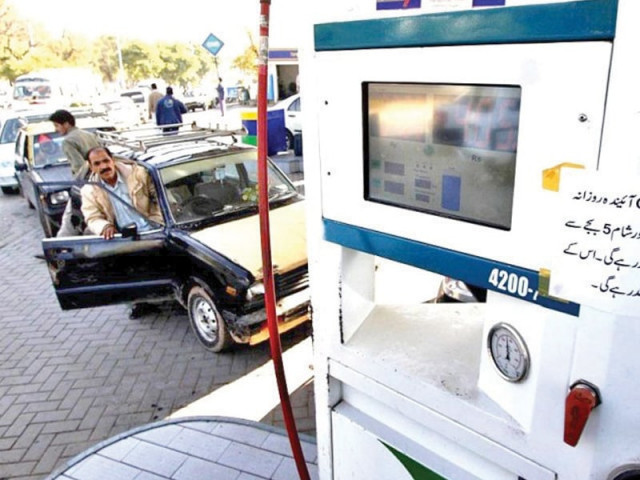Government turns down demand for deregulating CNG prices
Plans to establish three regions for fixing gas prices.

However, it has dismissed the demands made by the CNG station operators for deregulating CNG prices and changing the base set for margin revision.
The policy is expected to come into force from July 1, the start of the new fiscal year, to reflect the revision in gas sales prices and other relevant factors.
To discuss new policy guidelines, Minister of Petroleum and Natural Resources Shahid Khaqan Abbasi constituted a committee comprising members of his ministry, the Finance Division and Oil and Gas Regulatory Authority (Ogra).
The committee has so far held three meetings in which members of the All Pakistan CNG Association have also been given an opportunity to present their case.
The committee agreed that operating cost of CNG stations should be increased to Rs7.90 per kg compared to the existing Rs5 per kg.
The body unanimously gave its consent to Ogra’s suggestion that three regions or slabs should be introduced on the basis of actual gross calorific value (GCV) prevailing in the regions.
However, the committee resisted any change in the basis of margins. According to the policy guidelines, CNG sale prices will be revised along with a revision in the cost of gas.
The issue of high altitude areas of Balochistan, where the metering system has some flaws, will be examined in detail pertaining to the cost of gas by a committee comprising members of the Hydrocarbon Development Institute of Pakistan that works under the Ministry of Petroleum, Ogra, Sui Northern Gas Pipelines, Sui Southern Gas Company and Pakistan Engineering Council.
The recommendations of the committee will be presented before the ECC for a final decision.
According to the new guidelines, CNG sale prices will be revised when the cumulative impact of the revision in the cost of compression or electricity is more than Rs1 per kg. The operating cost will be revised annually on the first day of July based on the Consumer Price Index (CPI).
The committee unanimously opposed the deregulation of CNG sale prices. The last revision in prices was made on December 17, 2013 following the Supreme Court’s order about application of 17% sales tax instead of 26% under the presumptive tax regime. Since then, CNG prices have remained unchanged.
In the new policy, three regions have been proposed for fixing gas prices compared to the existing two.
First region comprises Sindh (excluding Hatri and New Matli of Hyderabad region), Punjab (excluding Potohar regions, Bhakkar, Daud Khel, Kalabagh and Taman). For this, GCV has been set at 950 British thermal units (BTU).
Second region covers Balochistan, Punjab (Potohar regions ie Islamabad, Rawalpindi and Gujjar Khan), Khyber-Pakhtunkhwa (excluding Karak, Jehangiri, Tank, Chokora, Saray Narang, Bannu, Dera Ismail Khan, Tarkha Khoi, Zanaka, Lakki, Makori and Shakardara). For this, GCV has been set at 1,085 BTU.
Third region comprises Khyber-Pakhtunkhwa (Karak, Jehangiri, Tank, Chokora, Saray Narang, Bannu, Dera Ismail Khan, Tarkha Khoi, Zanaka, Lakki, Makori and Shakardara). For this, GCV has been set at 1,140 BTU.
The All Pakistan CNG Association is pressing for a review of the existing policy guidelines to reflect important factors including the impact of GCV on the cost of gas, inclusion of legitimate expenditures in operating expenses, rationalisation of margins, revision in gas sale prices, electricity cost, inflation (operating expenses) and deregulation of CNG prices.
Talking to The Express Tribune, the association’s Supreme Council Chairman, Ghayas Paracha, said the operating cost and margins of CNG stations should be linked with the sales volume.
The operating cost had increased due to gas load-shedding as CNG was available for only one day in Punjab, he said, adding margins of filling stations had dropped drastically because of load-shedding.
Paracha also suggested that electricity cost, which had increased in the last one year, should also be reflected in the new proposed mechanism.
Published in The Express Tribune, July 1st, 2014.
Like Business on Facebook, follow @TribuneBiz on Twitter to stay informed and join in the conversation.



















COMMENTS
Comments are moderated and generally will be posted if they are on-topic and not abusive.
For more information, please see our Comments FAQ